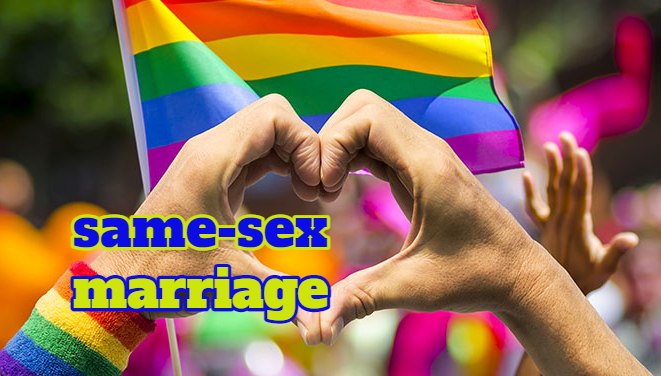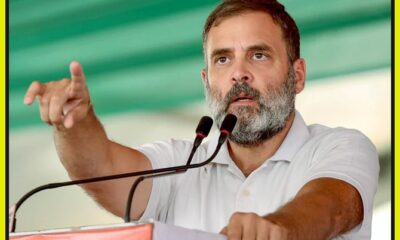News
The origins of same-sex marriage.
Published
1 year agoon

Learn about the history, developments, and difficulties facing the realisation of universal human rights, including the legalisation of same-sex marriage.
Despite the use of gender-neutral language in the majority of marriage laws, marriage, a common cultural relationship, has historically only been recognised between people of different genders. Even though same-sex unions are gradually gaining social acceptance, many state constitutions still forbid them, which prevents them from enjoying the same legal and financial privileges as married couples in many states. This includes having access to jobs, joint tax returns, health benefits, and inheritance rights, all of which are typically only given to patriarchal de facto couples and exclude same-sex couples.
In spite of recent legal reform, many nations, including India, still do not recognise same-sex relationships, demonstrating the need for further advancement in the acceptance of all types of relationships.
Read Also:- The most potent rocket’s second launch attempt.
Same-Sex Relationships in the Past
In India, homosexuality has a long history, with artefacts from 1500 BC that include manuscripts, statues, and relics showing evidence of same-sex relationships. But the spread of Vedic Brahmanism and British colonialism resulted in the criminalization of homosexual behaviour. For instance, the Manusmriti set forth harsh punishments for homosexual and lesbian behaviour, such as caste loss, hefty fines, and whipping. Same-sex relationships between married women were punished even more harshly…
During British colonisation, the dominance of patriarchy and the influence of Victorian ideals further marginalised homosexuality in India. Western notions of “moral and psychological” sexuality were imposed on Indian culture, stigmatising same-sex desire. However, over the last century, the definition of homosexuality has evolved, with many countries now enshrining legal protections for LGBTQ+ people.
In 1994, South Africa became the first nation to formally recognise the civil rights of homosexuals. Other nations have also put laws in place to safeguard LGBTQ+ people from discrimination, including Australia, Germany, Luxembourg, the Netherlands, Switzerland, Iceland, Denmark, Sweden, and New Zealand. In 1996, the Supreme Court of the United States ruled that no state could enact legislation that discriminated against homosexuals. A big step towards recognising the rights of LGBTQ+ people in India was the decriminalisation of section 377 of the IPC in 2018 in the case of Navtej Singh V. Union of India.
Despite these developments, there is still a long way to go before the LGBTQ+ community in India and around the world enjoys complete legal and social equality.
The Global Scenario of Same-Sex Marriages
The acceptance of same-sex marriage and relationships varies greatly around the world, with some nations fully supporting it while others criminalising it. Despite the fact that many nations have decriminalised homosexuality and implemented laws to safeguard the rights of LGBTQ+ people, more than 70 nations still view it as a heinous crime, with some even enforcing the death penalty. Despite this, 25 nations, including Germany, South Africa, Canada, and Brazil, have legalised same-sex unions, and many more offer civil partnerships. Events like Sydney’s Midsumma and Johannesburg’s Gay & Lesbian Pride honour the LGBTQ+ community.
There is still a long way to go before there is complete equality, even though progress has been made in recognising the rights of same-sex couples. Even in nations where homosexuality is legal, there may be age restrictions or restrictions on rights and privileges. In some nations, homosexuality carries a life sentence in prison. However, organisations and individuals fighting for greater acceptance and equality are gaining ground in the global movement to legalise same-sex unions and protect the rights of the LGBTQ+ community.
Conclusion
The debate over same-sex marriage legalisation is not a democratic one, but rather a religious one. However, it is critical to consider all of the arguments for and against legalising same-sex marriage. Homosexuality is not a crime; it is simply another way for people to find love, physical fulfilment, or enjoyment. As a result, there is no justification for limiting two gay men to a civil ceremony that does not provide them with the same rights and security as heterosexual couples.
Regardless of the gender of the parties involved, love is a promise and a sign of affection. The values of marriage are not harmed or damaged by allowing two men or two women to publicly declare their love and commitment through marriage. It is time for our society to acknowledge that homosexuality is not abnormal and that all people, regardless of their sexual orientation, deserve equal rights. Legalising same-sex unions is a step in the direction of universal human rights.
In conclusion, our current policy of not encouraging gay marriage neither supports homosexuals nor safeguards society as a whole. It is time for us to take a more thorough and inclusive stance when it comes to discussing same-sex unions. To promote equal rights and protect the human rights of all individuals, we must recognise homosexuality as a natural and normal part of human diversity and legalise same-sex marriages.
Credent TV Editorial Team

You may like
-


Sine International School
-


Review of Aranmanai 4: Old-fashioned structure and cliched storyline twists make this scary movie appealing to children; adults should avoid it
-


After India wins the T20I series, Harmanpreet Kaur praises the opener, saying, “Good to see Shafali Verma doing well.”
-


Gandhis Choose Not To Run in Amethi; Rahul Gandhi Will Run in Raebareli
-


CBSE Result 2024 LIVE Updates: Date and Time Update for CBSE 10th and 12th
-


NEET UG Admit Card 2024 has been released at neet.ntaonline.in; How to Download
